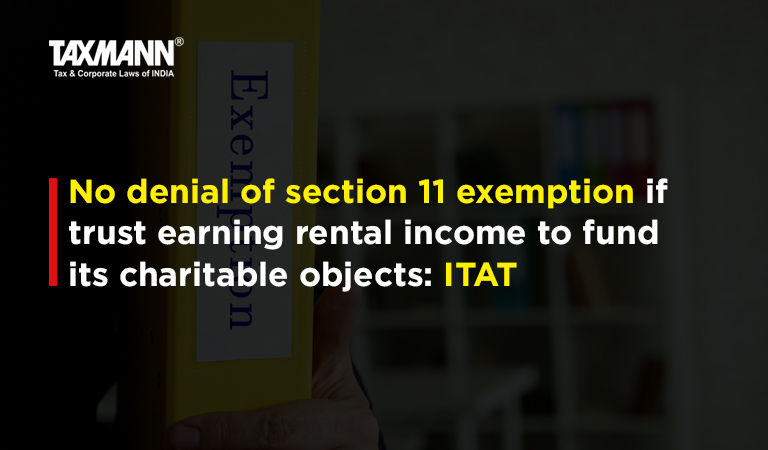No denial of section 11 exemption if trust earning rental income to fund its charitable objects: ITAT
- News|Blog|Income Tax|
- 2 Min Read
- By Taxmann
- |
- Last Updated on 15 June, 2022

Case Details: Oswal Bandhu Samaj v. ITO - [2022] 138 taxmann.com 561 (Pune-Trib.)
Judiciary and Counsel Details
-
- R.S. Syal, Vice President & S.S. Viswanethra Ravi, Judicial Member
- Neelesh Khandelwal for the Appellant.
- Piyush Kumar Singh Yadav for the Respondent.
Facts of the Case
Assessee was a charitable trust registered under section 12AA. It was engaged in providing medical help, education help, and relief to the poor. The assessee filed a return of income and declared nil income.
The Assessing Officer (AO) observed that the assessee had generated rental income from letting out of buildings and cultural halls. He held that the assessee was hit by the first proviso to section 2(15) and hence not eligible under section 11.
On appeal, CIT(A) upheld the order of AO. The aggrieved assessee had come up in appeal before the Tribunal.
ITAT Held
The Tribunal held that the denial of exemption by the AO on merits was based on the fact that the assessee was mainly pursuing objects of general public utility by getting engaged in letting out its building and halls and was hence hit by the proviso to section 2(15).
On an overview of the copious details furnished by the assessee, it was clear that the assessee was genuinely pursuing activities in the nature of medical help to the patients, Education expenses of the deserving students, and Relief to the poor.
Further, if we sum up the expenses from the Income and Expenditure Account, there was hardly any amount left for pursuing ‘advancement of any other object of general public utility. Thus, it could be said that the assessee had let out its Cultural halls and Building from time to time for earning revenue so as to fund its charitable objects.
Accordingly, albeit the assessee had the objects of ‘advancement of any other object of general public utility in its trust-deed, but none of such objects was actually pursued during the year under consideration. Thus, the assessee was entitled to exemption under section 11.
Disclaimer: The content/information published on the website is only for general information of the user and shall not be construed as legal advice. While the Taxmann has exercised reasonable efforts to ensure the veracity of information/content published, Taxmann shall be under no liability in any manner whatsoever for incorrect information, if any.

Taxmann Publications has a dedicated in-house Research & Editorial Team. This team consists of a team of Chartered Accountants, Company Secretaries, and Lawyers. This team works under the guidance and supervision of editor-in-chief Mr Rakesh Bhargava.
The Research and Editorial Team is responsible for developing reliable and accurate content for the readers. The team follows the six-sigma approach to achieve the benchmark of zero error in its publications and research platforms. The team ensures that the following publication guidelines are thoroughly followed while developing the content:
- The statutory material is obtained only from the authorized and reliable sources
- All the latest developments in the judicial and legislative fields are covered
- Prepare the analytical write-ups on current, controversial, and important issues to help the readers to understand the concept and its implications
- Every content published by Taxmann is complete, accurate and lucid
- All evidence-based statements are supported with proper reference to Section, Circular No., Notification No. or citations
- The golden rules of grammar, style and consistency are thoroughly followed
- Font and size that’s easy to read and remain consistent across all imprint and digital publications are applied



 CA | CS | CMA
CA | CS | CMA
